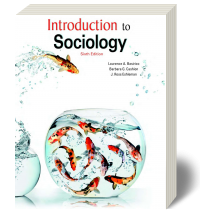Introduction to Sociology
Sixth Edition Basirico, et al., © 2014, 732 pages
Introduction to Sociology introduces today's students to sociology while making it relevant to their lives. Pedagogical aids include chapter summaries, key terms, and sections for thinking sociologically; end of chapter questions encourage students to assimilate and apply fundamental sociological principles to everyday situations.
Request Examination Copy Test Drive LAB BookPrices and ISBNs
This title is available in the following formats.
|
Product
Description ISBN |
Description | ISBN | Bookstore (Net Price) |
Student (Retail Price) |
Supplements
The available Supplements are listed below:
Click here to access ancillaries save_altInstant Access (and Coupons)
All students can have free Instant Access to an eBook for the first two weeks of class while they procure their textbook. They will also receive a 10%-off coupon valid at the BVT web store for the best possible price. Get instant access codes here.
Instructor's Manual
The Instructor's Manual consists of chapter summaries, learning objectives, key terms, chapter and lecture outlines, answers to textbook review questions, lecture suggestions and classroom activities to better assist you with your teaching curriculum.Lecture Slides 01-07
This PowerPoint™ slide set combines figures, tables and text to further illustrate the principles discussed in the text.2018 - Exam Bank
The Exam Bank contains questions in a variety of formats including multiple choice, true/false, short answer, and essay questions.Lecture Slides 08-13
This PowerPoint™ slide set combines figures, tables and text to further illustrate the principles discussed in the text.2018 - Test Bank (Blackboard)
The Blackboard Test Bank contains questions in a variety of formats including multiple choice, true/false, short answer, and essay questions. This file is an archive of per-chapter zipped Blackboard pool files.Lecture Slides 14-18
This PowerPoint™ slide set combines figures, tables and text to further illustrate the principles discussed in the text.2018 - Quiz Bank
The Quiz Bank contains questions in a variety of formats including multiple choice, true/false, and short answer questions.Lecture Slides 19-21
This PowerPoint™ slide set combines figures, tables and text to further illustrate the principles discussed in the text.2018 - Homework Bank
The Homework Bank contains questions in a variety of formats including multiple choice, true/false, and short answer questions.Online Course Management Software
Use our online course management software to create dynamic, randomly-generated tests which can be downloaded directly into your course management software, such as Blackboard, Web CT, Desire 2 Learn, and E Learning.Study Guide
This thorough and practical student study guide includes learning objectives, chapter outlines, questions, and ideas that help the student review material presented in the text. Also included are student activities and projects designed to enhance the practical application of sociological concepts.Test Bank
The Test Bank contains multiple choice and true/false questions.Test Bank (Blackboard)
The Test Bank contains multiple choice and true/false questions. This file is an archive of per-chapter zipped Blackboard pool files.Excerpts
The available Excerpts are listed below:
Description
Introduction to Sociology is acclaimed for its classic approach of introducing today's students to sociology while making it relevant to their lives. Each chapter contains numerous discussions of how sociology can be applied to one's personal and professional life. Pedagogical aids, listed throughout the textbook, include chapter summaries, key terms, and sections for thinking sociologically. In addition, end of chapter questions encourage students to assimilate and apply fundamental sociological principles to everyday situations.
- The opening vignettes that begin each chapter have been updated to reflect the most recent trends and statistics and 12 of them have been significantly revised. Five are brand new to this edition including vignettes on: preventable disasters (chapter 5) women in America (chapter 10) school bullying (chapter 14) influence peddling (chapter 15) and health as a social fact (chapter 20).
- Nearly 70 revised or new tables have been added throughout the book as well as figures containing the most current statistics available including data that incorporates the most recent decennial U.S. Census (2010) or annual updates.
- Over 136 new references and/or citations have been added.
- A continued emphasis on the relevance of sociology remains important and sections have been included in each chapter on how students can apply specific sociological theories and/or concepts to their professional and personal lives.

